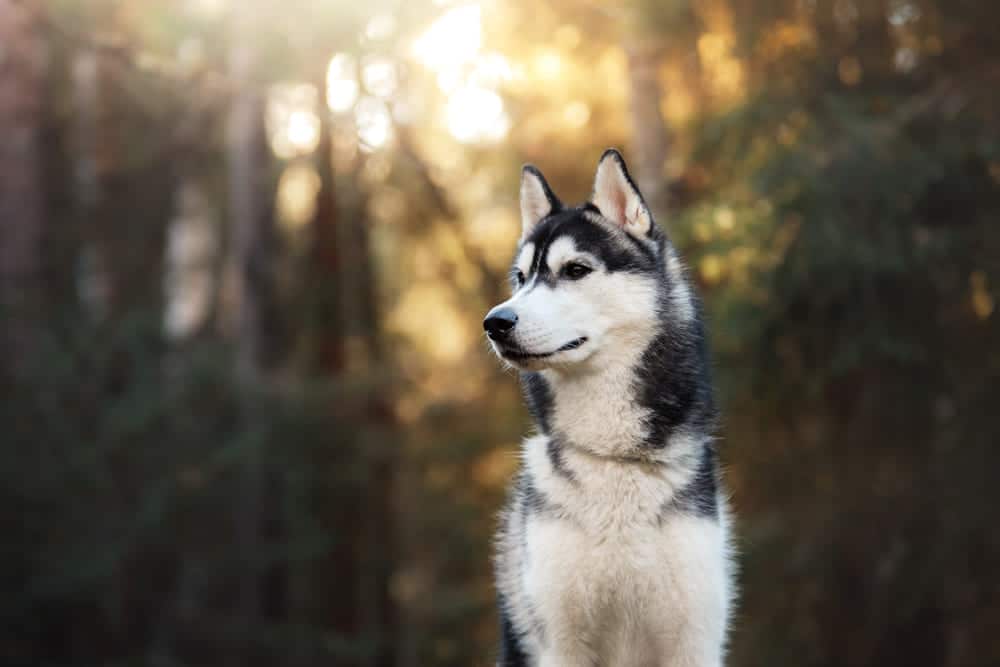Factors That Affect the Price Of Husky in America:
A Siberian husky’s purchasing price varies significantly based on several variables. This covers the puppy’s pedigree, the breeder’s repute, and the breeder’s location. Puppies bred to exhibit quality qualities or from prestigious bloodlines typically command a premium price. See below the factors that affect the price of husky in America.
Breeder Reputation:
Purchasing a Siberian Husky puppy from a respectable breeder should cost you, on average, between $600 and $1,500. The cost of the puppy may increase significantly, perhaps reaching $2,000 or more, if it has a unique pedigree or unusual coat colors.
Ancestry:
The bloodline of a Siberian Husky always has a significant impact on the dog’s cost. Puppies from Champion Bloodline are significantly more expensive than puppies from other common breeds of husky. In addition, mixed-breed huskies cost a lot less than purebred ones.
Age:
Another important factor that influences Siberian Husky prices is age. Younger puppies generally cost more than senior dogs. For instance, a 4-week-old puppy will probably cost you more than a 6-month-old Siberian Husky.
Younger puppies tend to be healthier than their older counterparts, who may be more prone to age-related illnesses, which is one of the reasons why they are more expensive.
Health:
Health is another factor that affects the price of Husky in America. A healthier puppy costs more than any other puppy.
Coat:
Coat Color is another factor that affects the price of Husky in America. The rarer the coat color costs more. A healthy coat also affects the price of the Husky.
Price Of Husky In Different States Of America
| Husky Dog Price In America | Reputable Breeder Price | Show-quality puppies Price | Adoption Fees | |
|---|---|---|---|---|
| Husky Dog Price In Alabama | $600-$1,500 | $2,000 + | $150-$500 | |
| Husky Dog Price In Alaska | $600-$1,500 | $2,000 + | $150-$500 | |
| Husky Dog Price In Arizona | $600-$1,500 | $2,000 + | $150-$500 | |
| Husky Dog Price In Arkansas | $600-$1,500 | $2,000 + | $150-$500 | |
| Husky Dog Price In California | $600-$1,500 | $2,000 + | $150-$500 | |
| Husky Dog Price In Colorado | $600-$1,500 | $2,000 + | $150-$500 | |
| Husky Dog Price In Connecticut | $600-$1,500 | $2,000 + | $150-$500 | |
| Husky Dog Price In Delaware | $600-$1,500 | $2,000 + | $150-$500 | |
| Husky Dog Price In Florida | $600-$1,500 | $2,000 + | $150-$500 | |
| Husky Dog Price In Georgia | $600-$1,500 | $2,000 + | $150-$500 | |
| Husky Dog Price In Hawaii | $600-$1,500 | $2,000 + | $150-$500 | |
| Husky Dog Price In Idaho | $600-$1,500 | $2,000 + | $150-$500 | |
| Husky Dog Price In Illinois | $600-$1,500 | $2,000 + | $150-$500 | |
| Husky Dog Price In Indiana | $600-$1,500 | $2,000 + | $150-$500 | |
| Husky Dog Price In Iowa | $600-$1,500 | $2,000 + | $150-$500 | |
| Husky Dog Price In Kansas | $600-$1,500 | $2,000 + | $150-$500 | |
| Husky Dog Price In Kentucky | $600-$1,500 | $2,000 + | $150-$500 | |
| Husky Dog Price In Louisiana | $600-$1,500 | $2,000 + | $150-$500 | |
| Husky Dog Price In Maine | $600-$1,500 | $2,000 + | $150-$500 | |
| Husky Dog Price In Maryland | $600-$1,500 | $2,000 + | $150-$500 | |
| Husky Dog Price In Massachusetts | $600-$1,500 | $2,000 + | $150-$500 | |
| Husky Dog Price In Michigan | $600-$1,500 | $2,000 + | $150-$500 | |
| Husky Dog Price In Minnesota | $600-$1,500 | $2,000 + | $150-$500 | |
| Husky Dog Price In Mississippi | $600-$1,500 | $2,000 + | $150-$500 | |
| Husky Dog Price In Missouri | $600-$1,500 | $2,000 + | $150-$500 | |
| Husky Dog Price In Montana | $600-$1,500 | $2,000 + | $150-$500 | |
| Husky Dog Price In Nebraska | $600-$1,500 | $2,000 + | $150-$500 | |
| Husky Dog Price In Nevada | $600-$1,500 | $2,000 + | $150-$500 | |
| Husky Dog Price In New Hampshire | $600-$1,500 | $2,000 + | $150-$500 | |
| Husky Dog Price In New Jersey | $600-$1,500 | $2,000 + | $150-$500 | |
| Husky Dog Price In New Mexico | $600-$1,500 | $2,000 + | $150-$500 | |
| Husky Dog Price In New York | $600-$1,500 | $2,000 + | $150-$500 | |
| Husky Dog Price In North Carolina | $600-$1,500 | $2,000 + | $150-$500 | |
| Husky Dog Price In North Dakota | $600-$1,500 | $2,000 + | $150-$500 | |
| Husky Dog Price In Ohio | $600-$1,500 | $2,000 + | $150-$500 | |
| Husky Dog Price In Oklahoma | $600-$1,500 | $2,000 + | $150-$500 | |
| Husky Dog Price In Oregon | $600-$1,500 | $2,000 + | $150-$500 | |
| Husky Dog Price In Pennsylvania | $600-$1,500 | $2,000 + | $150-$500 | |
| Husky Dog Price In Rhode Island | $600-$1,500 | $2,000 + | $150-$500 | |
| Husky Dog Price In South Carolina | $600-$1,500 | $2,000 + | $150-$500 | |
| Husky Dog Price In South Dakota | $600-$1,500 | $2,000 + | $150-$500 | |
| Husky Dog Price In Tennessee | $600-$1,500 | $2,000 + | $150-$500 | |
| Husky Dog Price In Texas | $600-$1,500 | $2,000 + | $150-$500 | |
| Husky Dog Price In Utah | $600-$1,500 | $2,000 + | $150-$500 | |
| Husky Dog Price In Vermont | $600-$1,500 | $2,000 + | $150-$500 | |
| Husky Dog Price In Virginia | $600-$1,500 | $2,000 + | $150-$500 | |
| Husky Dog Price In Washington | $600-$1,500 | $2,000 + | $150-$500 | |
| Husky Dog Price In West Virginia | $600-$1,500 | $2,000 + | $150-$500 | |
| Husky Dog Price In Wisconsin | $600-$1,500 | $2,000 + | $150-$500 | |
| Husky Dog Price In Wyoming | $600-$1,500 | $2,000 + | $150-$500 |
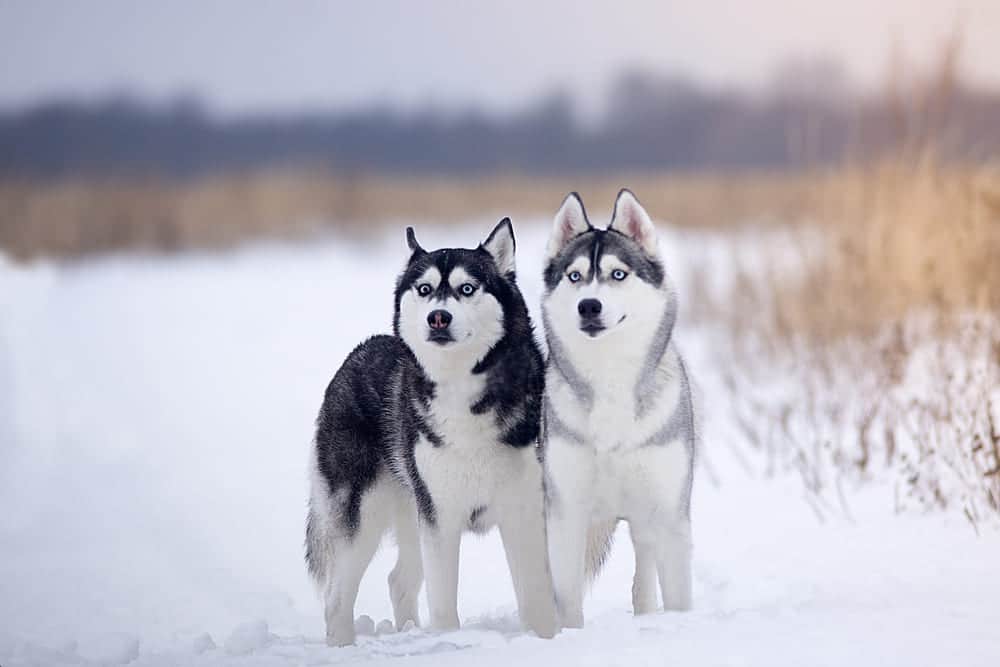
Is The Husky Popular In America:
Yes, Husky is one of the most popular dog breeds in America. This is one of the reasons for their high demand and cost.
Husky Availability In America:
Husky is widely available in America. In the city region, Huskies are more available.
Price Of A Husky In America:
After closely researching their pricing, we have concluded that most Siberian Husky puppies under the age of six months cost between $400 and $1,200.
Furthermore, if you want to purchase a Siberian Husky puppy from a champion bloodline, you need to budget at least $1,500. Adopting a purebred Siberian husky from reputable breeders will fall within this pricing range.
Monthly Maintenance Cost:
The monthly maintenance cost of Huskies are…
Diet:
Because Siberian Huskies have a lot of energy, feeding them is an essential aspect of their care. Depending on your dog’s unique dietary needs and the quality of the food you select, a well-balanced, nourishing meal can run anywhere from $40 to $60 a month.
Grooming:
Siberian Huskies typically have two shedding seasons a year, during which time their thick double coats are heavily shed. To prevent shedding and maintain the health of their coats, regular grooming is required. The average cost of a professional grooming session ranges from $50 to $100, depending on the services rendered and where you live.
Medical Costs:
The cost of routine medical care can range from $100 to $300 per month and includes immunizations, flea, tick, and heartworm prevention medications, as well as routine vet checkups. If your Siberian Husky has particular health problems or requires specialized medical care, these expenses may go up.
Training:
Although huskies are highly clever dogs, training them to obey can be challenging. Since huskies are not as food-motivated as other breeds, it can be difficult to come up with useful training rewards.
Early socialization and training are essential for a well-mannered and well-behaved husky, but many husky parents find that their dog requires reinforcement to reach the necessary training level.
Vaccinations:
The first immunizations given to a puppy are essential to its health and welfare. This price often ranges from $75 to $100 for each set, shielding them from a variety of illnesses and infections.
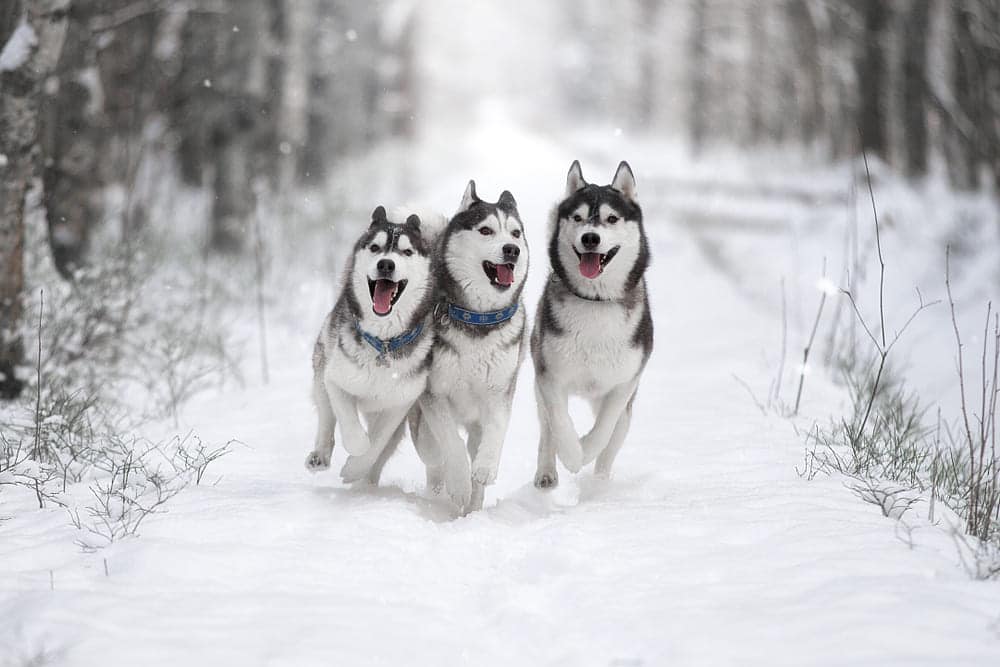
Why Get A Puppy From Husky Breeders in America:
In comparison to Siberian Husky puppies from backyard breeders, you need to budget more money if you decide to buy a puppy from a respectable breeder. Additionally, some dog breeders might belong to a well-known kennel club, such as the American Kennel Club (AKC), which might have a favorable effect on the dog’s pricing.
Why Choose Best For Pets To Purchase Husky Puppies In America:
Some pet breeders actively invest in the assessment and testing of various medical disorders because they are concerned about the health of their pets. They arrange for routine veterinary examinations and screening for a range of medical issues, which raises the cost but greatly improves the chances of receiving a healthy dog.
Additionally, some breeders offer socialized and trained pets for sale. Investing more money in a Siberian husky now could result in higher training costs down the road.
Benefits Of Purchasing A Husky In America:
This dog’s striking features, such as its multicolored or blue eyes and gorgeous, thick coat with a variety of odd colors, add to its enticing appeal. So, here let’s know the benefits of purchasing a husky in America.
Playful Dog:
Huskies are also incredibly energetic, playful, and nimble animals. They make terrific running, hiking, camping, and riding partners because they love being in nature. This breed, which was developed to pull sleighs over very long distances, enjoys hard exercise, particularly in the winter. Investing in carts and sleds to pull is a terrific way to give this energetic breed a purpose in life. An energetic person who appreciates the great outdoors would make the perfect owner.
Outstanding Lifespan:
If well-maintained and free of major health issues, the average lifespan of a Siberian Husky is 12 to 15 years.
Low Requirements:
The husky breed is initially developed to function on a small amount of food. It is not out of the ordinary for this breed to periodically refuse to eat. Even though a husky may need less food per pound than a dog of a different breed, they still require a well-balanced diet high in fat and protein. To choose the best diet, speak with a breeder.
Simple to Maintain:
A Siberian Husky requires very simple grooming. Huskies don’t smell, thus they don’t need much maintenance.
These dogs maintain their cleanliness and parasite-free coats through self-cleaning. It is advised, therefore, that you give your dog a bath at least twice a year.
Wolfish Look:
Of course, it is impossible to overlook this breed’s appearance. Many find this breed beautiful because of its brilliant coat, upright ears, and brush tail, which give it a wolflike look. The allure is enhanced by the ice blue eyes, though some Huskies can also have brown or bi-colored eyes.
Husky Vaccination Cost In America
Here’s a breakdown of the typical costs associated with vaccinating a Husky in America:
Core Vaccines (Essential)
- DHPP (Distemper, Hepatitis, Parainfluenza, Parvovirus):
- Puppies: Series of 3-4 shots, $20-$60 each
- Adults: Booster every 1-3 years
- Rabies:
- Puppies: One shot around 12-16 weeks, $20-$30
- Adults: Booster every 1-3 years (depending on state laws)
Optional Vaccines (Based on Lifestyle & Risk)
- Bordetella (Kennel Cough): $30-$50 (may be required for boarding or doggy daycare)
- Lyme Disease: $20 – $40 initially, then annually if recommended by your vet
- Leptospirosis: $20 – $30 initially, then annually if recommended
- Canine Influenza: $45 – $65 initially, then annually if recommended
Cost Factors:
- Location: Vet prices vary across the US.
- Clinic: Costs may differ between traditional veterinary clinics and low-cost vaccination clinics.
- Puppy Packages: Some clinics offer packages that bundle initial puppy vaccinations at a slightly reduced cost.
Typical Cost Ranges
- First Year Vaccinations: Expect to pay around $100 – $350 for a puppy’s first year of vaccinations, including core and optional vaccines.
- Annual Booster Costs: After the first year, annual costs for core booster vaccinations typically range from $80 – $250.
Saving on Vaccination Costs:
- Low-cost Vaccination Clinics: Many communities have these, offered by shelters or humane societies.
- Pet Insurance: Some pet insurance plans cover preventative care, including vaccinations.
- Wellness Plans: Veterinary clinics may offer wellness plans that spread the cost of preventative care throughout the year.
Important Notes
- Vet Recommendations: Always consult your veterinarian for the best vaccination schedule and recommendations based on your Husky’s individual needs and the disease risks in your area.
- Heartworm & Parasite Prevention: These are separate from vaccinations but vital for your dog’s health. They typically cost $24 – $132 annually for heartworm and $40 – $200 for flea/tick prevention.
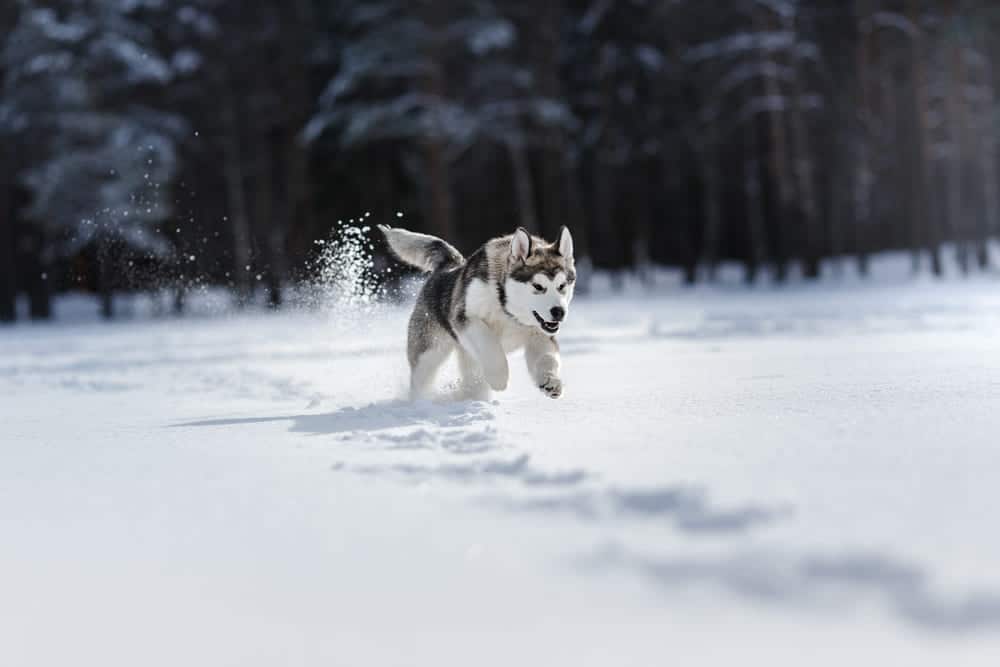
Husky Deworming Cost In America
The cost of deworming a Husky in America varies depending on a few factors:
- Type of Dewormer: Different deworming medications target specific types of worms (roundworms, hookworms, tapeworms, etc.). Your vet will choose the right medication based on your dog’s needs.
- Dosage: Dewormer cost is often calculated by your dog’s weight.
- Veterinary Clinic: Vet clinic fees can vary across the US.
- Puppy vs. Adult: Puppies often need more frequent deworming than adult dogs.
Typical Cost Ranges
- Single Deworming Treatment: Expect to pay around $15 – $50 per treatment.
- Puppy Deworming Protocol: Puppies typically need a series of deworming treatments over the first few months of life, so the total cost might be higher initially.
- Preventative Heartworm Medication: Many heartworm medications also contain deworming agents, providing convenient and cost-effective prevention. These generally range from $5 – $25 per month.
How Often Should You Deworm a Husky?
Your veterinarian is the best source for a deworming schedule tailored to your Husky. Here’s a general guideline:
- Puppies: Deworming every 2-3 weeks until 12 weeks of age, then monthly until 6 months old.
- Adult Dogs: At least twice a year, but more frequent treatments may be needed based on risk factors and fecal exams.
Where to Get Deworming Medication:
- Vet prescription: The safest and most accurate way to ensure the correct medication is through your veterinarian.
- Over-the-counter options: Available at pet stores but might not be as effective or target the correct worm types. Consulting your vet first is best.
Important Considerations:
- Fecal Exams: Regular fecal exams help your vet determine if parasites are present and choose the most appropriate treatment.
- Prevention: Good hygiene practices (picking up feces, washing hands, etc.) significantly reduce reinfection risk.
Husky Spaying Or Neutering Cost In America
Here’s a breakdown of the costs typically associated with spaying (female) or neutering (male) a Husky in America:
Factors Affecting Cost:
- Location: Veterinary costs tend to be higher in urban centers compared to smaller towns.
- Clinic: Prices can vary between traditional private clinics, low-cost spay/neuter clinics, and animal shelter services.
- Dog Size: Larger breeds may be slightly more expensive due to needing more anesthesia.
- Age: Surgery might be more costly with older dogs due to potential health factors.
- Medical Conditions: Any underlying health issues could increase surgical complexity.
- Additional Procedures: Combining spaying/neutering with other procedures (e.g., microchipping) may be slightly more expensive.
Typical Cost Ranges
- Neutering (Male):
- Traditional Clinic: $150 – $400
- Low-cost Clinic: $75 – $200
- Spaying (Female):
- Traditional Clinic: $250 – $600
- Low-cost Clinic: $100 – $300
Financial Assistance
If cost is a concern, here are some resources:
- Low-cost Spay/Neuter Clinics: Many communities have these, often subsidized by animal welfare organizations.
- Shelters: Some shelters offer spay/neuter services at reduced rates or include them in adoption fees.
- Financial Aid Programs: Humane societies or rescue groups may offer financial assistance.
Benefits of Spaying/Neutering
Beyond preventing unwanted litters, spaying and neutering offer significant health and behavioral benefits:
- Health
- Reduces the risk of certain cancers (mammary, uterine, testicular)
- Eliminates the risk of pyometra (a life-threatening uterine infection in females)
- May help prevent prostate problems in males
- Behavior
- Can reduce roaming tendencies in males
- May lessen marking behaviors
- Eliminates heat cycles in females
Additional Notes
- Timing: Vets typically recommend spaying/neutering Huskies around 6-9 months of age, but your vet will advise the best time for your individual dog.
- Consult your Veterinarian: They’ll discuss the procedure, risks, and costs, and help you decide if it’s the right choice for your Husky.
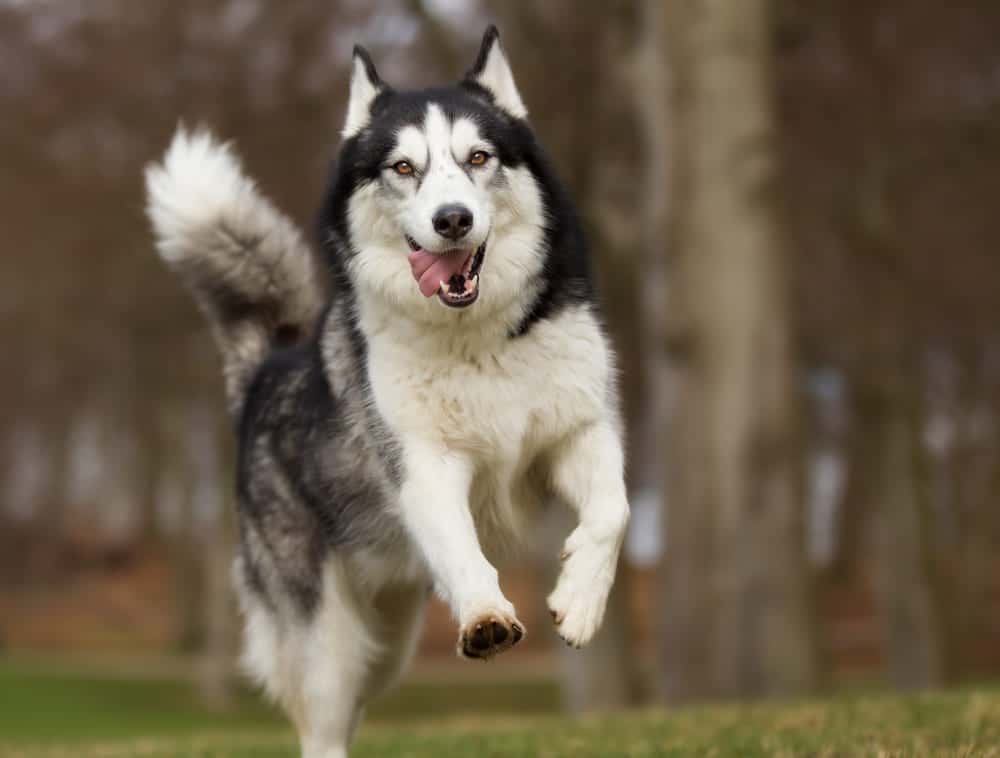
Common Health Conditions
Here’s a breakdown of common health conditions found in Huskies, along with some additional information and images where relevant:
Joint Problems:
- Hip Dysplasia: A malformation of the hip joint, causing pain, lameness, and arthritis. Common in large breeds.
- Elbow Dysplasia: Similar to hip dysplasia, but affecting the elbow joint.
Eye Conditions:
- Cataracts: Clouding of the eye lens, leading to impaired vision.
- Progressive Retinal Atrophy (PRA): A group of inherited diseases that cause degeneration of the retina, leading to blindness.
- Corneal Dystrophy: Clouding of the cornea, which can affect vision.
Other Conditions:
- Hypothyroidism: Underactive thyroid gland, leading to lethargy, weight gain, and skin problems.
- Zinc Deficiency: Huskies can be prone to zinc deficiency, causing skin issues and hair loss.
- Follicular Dysplasia: A condition causing hair loss and skin problems.
- Uveodermatologic Syndrome: An autoimmune disorder affecting eyes, skin, and sometimes the nervous system.
Important Notes:
- Responsible Breeding: Choosing a reputable breeder who screens for health conditions can significantly reduce the risk of these problems in your Husky.
- Regular Vet Visits: Early detection of health problems is key for successful management and treatment.
- Healthy Lifestyle: Maintain a healthy weight and provide regular exercise to support overall health and wellness.
Remember, not all Huskies will develop these conditions, and many live long, healthy lives. Being aware of potential issues will help you be a responsible Husky owner!

